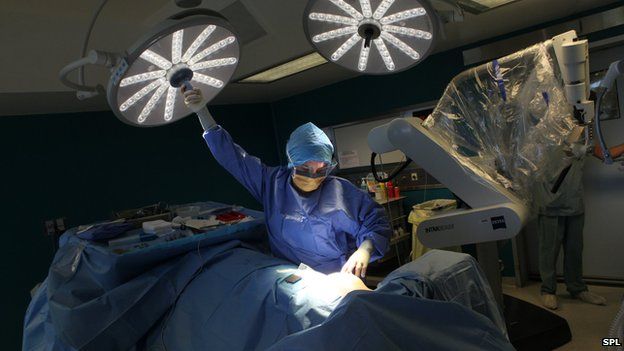Breast cancer: One-shot therapy gets NHS nod
- Published

A pioneering breast cancer treatment that replaces weeks of radiotherapy with a single, targeted shot is set to be offered on the NHS.
The dose of radiation is delivered from inside the breast, once a tumour has been removed in surgery.
It would benefit up to 36,000 people and should also save the NHS money.
Draft guidance from the National Institute for Health and Care Excellence (NICE) said it would improve patients' quality of life.
The technique, called intra-operative radiation, is suitable only for patients who have caught their cancer early.
Marcelle Bernstein: "I didn't feel I was battling cancer - all these horrible war words that people use"
Currently, those patients would have surgery to remove the tumour. They would then face at least another 15 trips to hospital for radiotherapy to kill any remaining cancerous cells.
One shot wonder
Intra-operative radiation is performed during surgery.
Once the tumour is removed, a probe is inserted into the breast and delivers radiation to the exact site of the cancer for about half an hour.
Tests on more than 2,000 people suggest the technique has a similar level of effectiveness as conventional radiotherapy.
However, as the technique has been developed recently, there is no long-term data available.
As well as avoiding the inconvenience of regular hospital trips, the single dose should avoid potential damage to organs such as the heart, lung, and oesophagus - which is a risk during radiation to the whole breast.
NICE said the pros and cons should be made clear to patients.
Prof Carole Longson, director of health technology evaluation at NICE, said: "Because it is still relatively new, it is only right to recommend its use in a carefully controlled way.
"This will ensure patients are fully aware of the risks and benefits before choosing which treatment to have and allow doctors to gather more information about the treatment."
A typical radiotherapy department will spend around 30% of its time dealing with breast cancer.
Previous estimates have suggested a shift to intra-operative radiation could free up resources and save the NHS £15m a year.
But the equipment is expensive to start with - each probe would cost about £500,000.
Prof Jeffrey Tobias, who has pioneered the technique at University College London Hospitals, told the BBC:"We're lagging behind, we're out of step, it's a great pity.
"In Germany there are 60 centres capable of doing this, in the UK there are six.
"So for us this is fantastic news because it will stimulate the uptake of something that started here."
If approved, the guidelines would be introduced in England towards the end of the year. Wales and Northern Ireland tend to follow NICE guidelines at a later date, while Scotland considers treatments separately.
Play it safe
Breakthrough Breast Cancer senior policy officer Sally Greenbrook said patients who needed radiotherapy were "travelling to and from hospital every day, five days a week for three weeks".
"That's hugely inconvenient - it's disruptive to their lives, its disruptive to their families lives," she told the BBC.
"This [the new treatment] means they can get on with rest of their treatment much quicker, they can get on with the rest of their lives much quicker."
Emma Greenwood, Cancer Research UK's head of policy, said: "This could be good news for breast cancer patients.
"Giving radiotherapy in a single dose at the time of surgery potentially offers a huge benefit, especially if it means fewer visits to hospital.
"It's essential that those who receive this radiotherapy are followed up for a long period of time to ensure the single dose is as at least as effective as the standard treatment.
"Radiotherapy is already a very effective treatment, and this technique could offer another valuable option for treating early breast cancer."
- Published5 June 2010
- Published18 May 2007